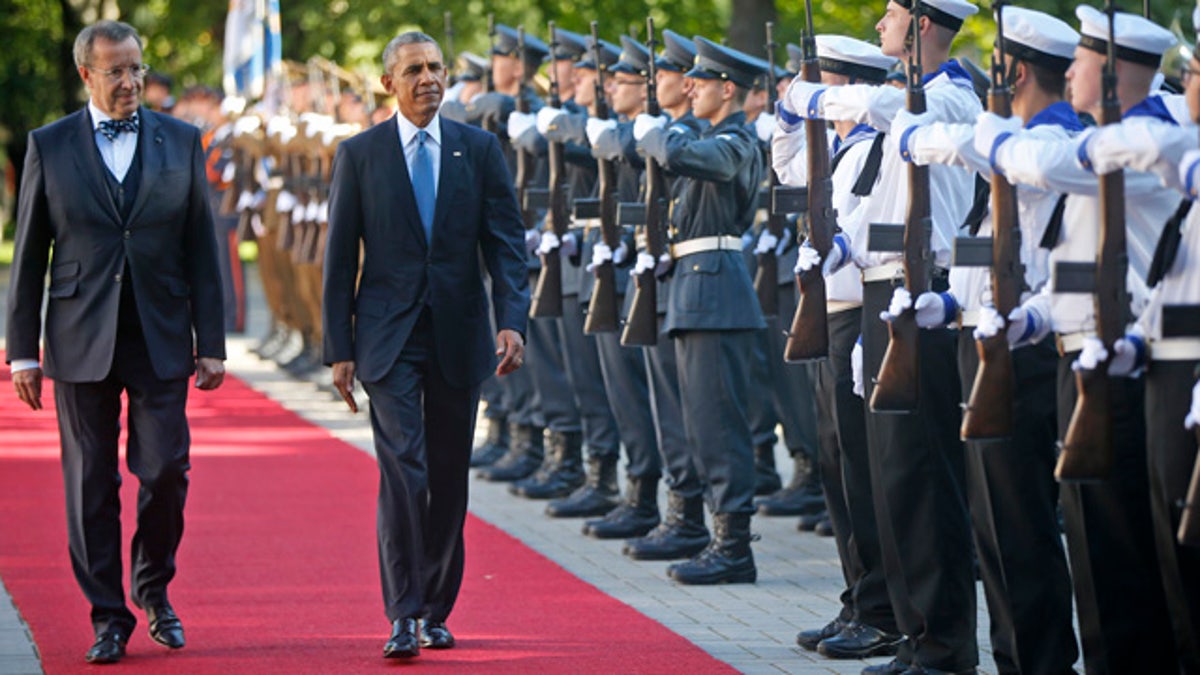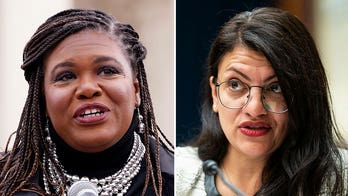
September 3, 2014: U.S. President Barack Obama and Estonian President Toomas Hendrik Ilves review the honor guard at Kadriorg Palace in Tallinn. (AP Photo/Charles Dharapak)
President Obama announced plans to send Air Force units and aircraft to the Baltic republics as part of an effort to reassure the countries of Estonia, Latvia, and Lithuania of their security as NATO members in the wake of the ongoing unrest in Ukraine.
With Moscow supporting pro-Russian separatists in eastern Ukraine, NATO allies such as Estonia fear they could be the next target, and Obama's one-day visit to that country was designed to emphasize the U.S. commitment to defending its allies and ramp up consequences for Russian President Vladimir Putin. Obama, ticking through a list of U.S. military resources already at work in the region, said the U.S. has a duty under the NATO charter to the alliance's collective defense.
"It is unbreakable, it is unwavering, it is eternal. And Estonia will never stand alone," Obama said at a joint news conference with Estonian President Toomas Hendrik Ilves.
Standing shoulder to shoulder with Estonia's president, Obama called Estonia's Amari Air Base an ideal location to base those additional forces, which come as NATO nations prepare to bolster a rapid-response force for the region.
Shortly after Obama arrived in Europe, the office of Ukraine's president said he and Russian President Vladimir Putin had reached agreement on a cease-fire -- an unexpected development that added further uncertainty to Obama's meetings with regional leaders.
Obama said it was too early to tell what the cease-fire meant. He noted previous unsuccessful attempts and questioned whether pro-Russian separatists would abide by any cease-fire.
"We haven't seen a lot of follow-up on so-called announced cease-fires," Obama said. "Having said that, if in fact Russia is prepared to stop financing, arming, training, in many cases joining with Russian troops, activities in Ukraine and is serious about a political settlement, that is something we all hope for."
Ilves, reacting to word of the cease-fire, said wryly, "I just hope it works."
The Estonian leader cautioned that for a cease-fire to be successful, Russia would have to acknowledge its own participation in the conflict -- a step Moscow has previously refused to take. After a meeting with Ukrainian President Petro Poroshenko last week, Putin had said a cease-fire was not discussed because Russia was not a party to the conflict.
"This is aggression," Ilves said. "Russia must admit that it is a party to the conflict."
He called for "a robust and a visible ally presence here in Estonia," arguing that such a presence would be the best way to deter any potential aggressors in the region -- a clear reference to Russia.
Obama held up Estonia as an example of how every member of the military alliance needs to do its fair share for the collective defense of all 28 members. The U.S. and Estonia are two of four NATO countries that fulfill their pledges to contribute 2 percent of their GDP to defense spending.
The Associated Press contributed to this report.




